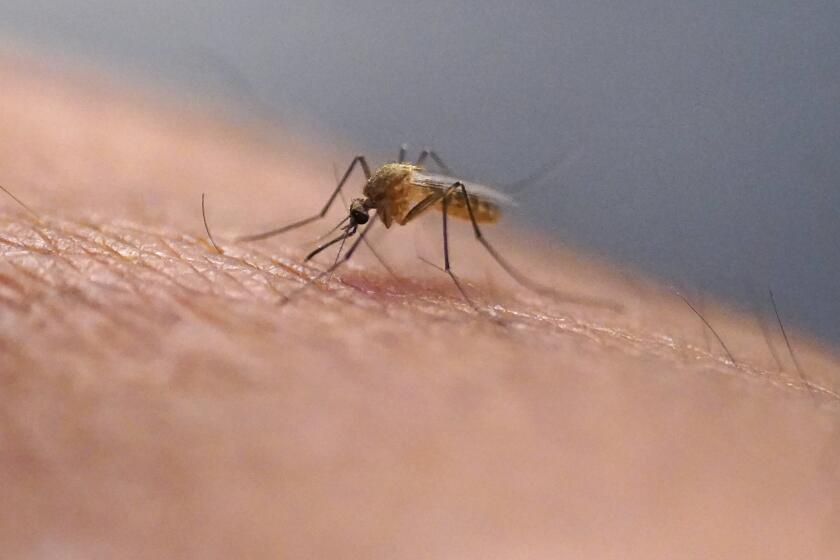The Bay Area’s first mosquito-related death and the detection of mosquitoes carrying West Nile virus in Southern California highlight the risks facing Californians as they spend more time outdoors this summer.
But experts say there are simple precautions people can take to reduce the chances of contracting the virus through a bite.
A man in eastern Contra Costa County died from West Nile virus infection on July 16, the first West Nile virus death reported in the county since 2006, according to the county’s public health department.
The Contra Costa Department of Health’s Infectious Disease Program is investigating the incident and it has not been determined where the patient contracted the infection. news releaseThe department is not releasing details about the case to “protect medical privacy.”
Evidence of West Nile virus was recently found in the same area: Contra Costa Vector Control discovered one dead bird and five chickens that tested positive for the virus in Oakley.
West Nile virus is Infectious to birds It is transmitted through the bite of an infected mosquito. Mosquitoes that feed on infected birds become infected with the virus. Infected mosquitoes can then transmit the virus to humans and other animals.
The infection causes fever, headache, vomiting and a rash and can be dangerous to humans.
Two cases of West Nile virus infection have been reported in Fresno and Yuba counties, the weekly newspaper reported. California Arbovirus Surveillance BulletinIn addition, three asymptomatic blood donors in Fresno County have tested positive for West Nile virus, according to the state Department of Public Health.
On July 26 alone, a total of 140 new West Nile virus positive mosquito swarms were reported from 21 counties, including Los Angeles, Orange, Placer, Riverside, San Bernardino, Santa Clara and Yuba. So far in 2024, 583 West Nile virus positive mosquito swarms have been found in 24 counties.
Last month, Los Angeles County announced that mosquitoes carrying the virus Recovered from a Winnetka trap San Fernando Valley neighborhoods.
In a statement, The Los Angeles County Vector Control District said in a statement that while West Nile virus outbreaks in the area are not uncommon, “this early detection serves as an important reminder for all residents to take preventative measures.”
Something that attracts mosquitoes
According to the American Mosquito Control Association, there are 30 species of mosquitoes that live in the U.S. Although there are differences between mosquito species (some feed during the day and others at night, for example), they all share a life cycle that relies on water to reproduce.
There are six species of mosquitoes in California, but only the Culex mosquito can transmit the West Nile virus.
Vector control agencies work to eliminate public breeding sites such as gutters, underground storm drains, flood control channels, landslide ponds, etc. However, mosquito control is a shared responsibility and residents must play their part in eliminating potential breeding sites around their homes.
Start by identifying objects on your property that are likely to collect water. Water that remains standing for at least seven days will attract mosquitoes. Typical locations include bird baths, old tires, clogged gutters, portable basketball goals, uncovered outdoor grills, potted plants with saucers, and vases.
read more: Mpox is on the rise in Los Angeles County: Here’s how to avoid it
According to the American Mosquito Control Association, stagnant water mixed with leaves, dirt, and grass clippings encourages mosquito breeding.
Eliminate these breeding sites by draining or discarding the water and preventing further accumulation of water — for example, by overturning buckets of rainwater or putting covers on grills — at least once a week.
How to get rid of mosquitoes
The Greater Los Angeles County Vector Control District recommends that residents apply EPA-registered repellents containing one of the following active ingredients: DEET, picaridin, IR3535 (ethyl butylacetylaminopropionate), paramenthanediol, 2-undecanone (a plant-derived ingredient), or lemon eucalyptus oil.
Centers for Disease Control and Prevention They recommend not spraying insect repellent under clothing, and if you use sunscreen, they recommend applying the sunscreen first and then the insect repellent.
Alternatives to chemical-based sprays and creams include repellents that contain plant-based ingredients like citronella, lavender and peppermint. The American Mosquito Control Association says these ingredients are less effective than synthetic alternatives, but can still be effective for people who don’t like mosquitoes much.
You can also make your outdoor recreation area mosquito-proof by setting up a number of tiki torches or other repellent-dispersing devices, although the effectiveness of the device will vary depending on the type of mosquito.
For example, the Los Angeles County Vector Control District says that citronella candles are effective at repelling mosquitoes only in the immediate vicinity of the candle and only if there is no wind, and that candles that are typically placed on tables do not provide sufficient protection because Aedes mosquitoes prefer to live on the ankles.
read more: Mosquitoes ruin your hike. Here’s how to prevent them
Certain plants also offer some degree of protection for your patio. These include some varieties of citronella and geranium, marigolds, lemongrass, catnip, certain types of mint, lavender, and lantana. Common aromatic herbs, such as rosemary, garlic, basil, thyme, and fennel, have limited effectiveness in repelling mosquitoes.
Try them one at a time until you find the approach that works best for you.
If you still get bitten by a mosquito despite taking all these precautions, do not scratch it, as scratching can cause a secondary infection and prolong the inflammation. In severe cases, scratching can even leave scars.
Usually, an anti-itch cream is all you need to soothe the discomfort, but if you have a severe allergy to mosquitoes, you may need a cream with Benadryl or a similar antihistamine, according to the American Mosquito Control Association.
This story was originally Los Angeles Times.


